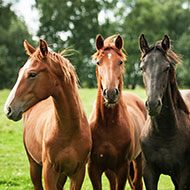
Website provides the latest updates on this common disease
A new website that allows vets, horse owners and paraprofessionals to share information about strangles has been launched by the Animal Health Trust (AHT).
Developed by the AHT’s Surveillance of Equine Strangles scheme, the resource contains up-to-date information on diagnoses of the disease across the UK.
Researchers hope the website will become key for people owning and working with horses, as well as those travelling to areas which have seen higher rates of diagnoses of strangles.
“This new website provides comprehensive insights about the disease in a very up-to-date manner in a way that has never been available before,’ commented Dr Richard Newton, director of Disease Surveillance and Epidemiology at the Animal Health Trust.
“However, the resource is only as useful as the data supplied from vets on the ground. I would urge colleagues to help us to keep this resource as up-to-date and comprehensive as possible by completing full details on submission forms being sent to any laboratory, so this information can contribute – anonymously – to the national picture of strangles.”
The website contains an interactive map, highlighting regions where strangles cases have been confirmed, together with demographics of hoses being confirmed with infection.
Users can zone in on the information that is relevant to them, as well as view stats based on the geography of veterinary practices making diagnoses. They can also use the tool to highlight seasonal trends and view the most important clinical signs.
The AHT aims to expand the website to include international data on strangles, which could subsequently lead to new strategies on how to improve the disease in other parts of the world.
“Our aim with the Surveillance of Equine Strangles scheme is to reduce the spread of the disease,” explained Abbi McGlennon, PhD student at the Animal Health Trust, who led the development of the resource.
“This website is one of the first key tools to emerge from the larger surveillance project. It joins the dots across the equine industry by collating information from laboratory-confirmed strangles diagnoses and communicating this back in almost real-time.
“I’m excited about the prospect of extending this internationally, and the difference that could make for horses globally,” she said.



 The Federation of Independent Veterinary Practices (FIVP) has announced a third season of its podcast, Practice Matters.
The Federation of Independent Veterinary Practices (FIVP) has announced a third season of its podcast, Practice Matters.